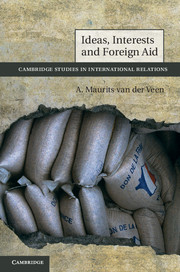Book contents
- Frontmatter
- Contents
- Figures
- Tables
- Preface
- 1 The many uses of foreign aid
- 2 One policy, multiple goals
- 3 Debates about aid
- 4 Aid frames
- 5 The administration of aid policy
- 6 The generosity contest
- 7 The popularity contest
- 8 Conclusion
- Appendix A Legislative debates coded
- Appendix B Debate coding examples
- Appendix C Aid distribution: data and sources
- Bibliography
- Index
7 - The popularity contest
selecting the recipients of aid
Published online by Cambridge University Press: 07 September 2011
- Frontmatter
- Contents
- Figures
- Tables
- Preface
- 1 The many uses of foreign aid
- 2 One policy, multiple goals
- 3 Debates about aid
- 4 Aid frames
- 5 The administration of aid policy
- 6 The generosity contest
- 7 The popularity contest
- 8 Conclusion
- Appendix A Legislative debates coded
- Appendix B Debate coding examples
- Appendix C Aid distribution: data and sources
- Bibliography
- Index
Summary
Criteria for the choice of main recipient countries must be taken seriously!
– Headline, Norkontakt, 1983No aspect of aid policy attracts more attention, in political debates and in academic circles, than does the distribution of aid funds across recipient countries. Studies of the determinants of aid allocation date back to the early 1960s and continue to account for the bulk of the literature today. Such studies have posited causal effects for a wide range of explanatory variables, but definitive conclusions have been elusive. On the one hand, theoretical as well as methodological problems frustrate the quantitative analysis of aid allocation. On the other hand, virtually all qualitative analyses, whose findings might offer a richer understanding of the factors driving the geographical distribution of aid, are single-country studies. This chapter addresses each of these problems.
An analysis of aid distribution decisions in Belgium, Italy, the Netherlands and Norway demonstrates that this aspect of official aid programmes is shaped by aid frames just as much as are the other aspects we considered in the preceding chapters. In Belgium, economic self-interest has been pre-eminent in the selection of new countries, whereas the obligation frame has kept the share of aid allocated to the former colonies high. In Italy, the wealth frame has been so dominant that the country long avoided even setting criteria for the selection of aid recipients, preferring to let private industry find projects wherever it might. In the Netherlands, the power frame increased the emphasis on taking the lead in initiatives suggested by the humanitarian frame, with the result that aid became increasingly dispersed in response to a succession of different priorities. In Norway, finally, the reputation and enlightened self-interest frames generated a preference for larger LDCs, whereas the humanitarian frame inspired an emphasis on the poorest recipient states from the beginning.
Information
- Type
- Chapter
- Information
- Ideas, Interests and Foreign Aid , pp. 171 - 209Publisher: Cambridge University PressPrint publication year: 2011
